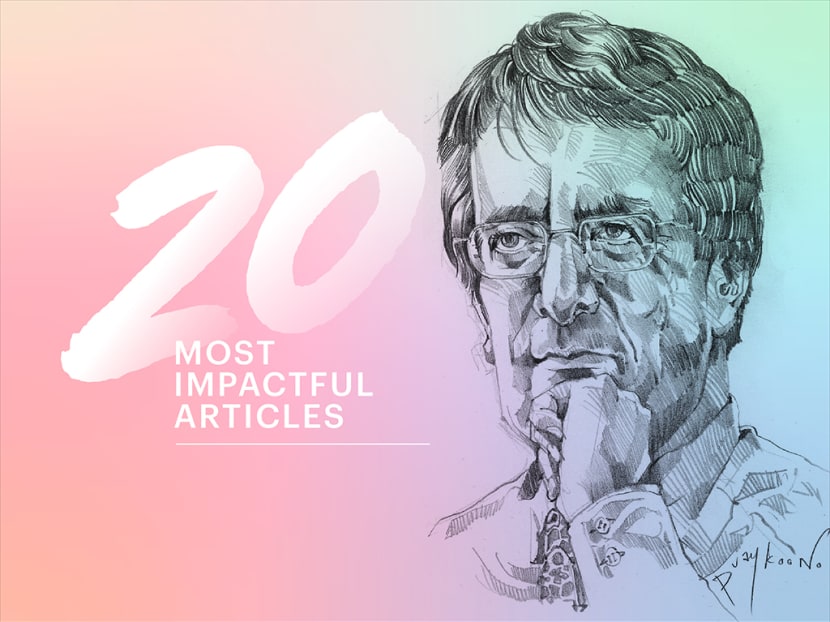TODAY20: Blood storm — doctors complain of ethical issues (Jan 18, 2003)
Over the past two decades, TODAY has played an active role in public discourse in Singapore. To mark our 20th anniversary in November, we are re-publishing 20 of our most impactful articles over the years.
Over the past two decades, TODAY has played an active role in public discourse in Singapore. To mark our 20th anniversary in November, we are re-publishing 20 of our most impactful articles over the years.
WHAT HAPPENED
- TODAY broke the news in 2003 about a research project that had breached medical research ethics
- The project was headed by then National Neuroscience Institute director Simon Shorvon, who was a renowned epilepsy expert and had been given a S$10 million grant to conduct the research into Parkinson's disease and other conditions
- Some patients were misled into donating their blood, while others complained that their blood was being drawn too often and they were not told why
WHAT NEXT
- Three separate inquiries in Singapore found Professor Shorvon guilty as charged for committing serious ethical and professional breaches by recruiting patients and altering their medications without their consent or the knowledge of their neurologists
- He was then sacked but returned to the UK to take on another job
- The three-year saga saw the Singapore Medical Council (SMC) taking the case to the British High Court. However, the judge dismissed the SMC’s application to get its British counterpart to conduct a public inquiry in Britain into Prof Shorvon's behaviour
SINGAPORE — A research project at the National Neuroscience Institute (NNI) has been thrown into disarray and some top members of the team have resigned, alleging a breach of medical research ethics.
Among those who have quit the research team are Associate Professor Lee Wei Ling, deputy director (clinical) of the NNI, and Dr Yee Woon Chee, deputy director (research). Assoc Prof Lee walked out of the research team after indicating that she was upset with ethical aspects of the way in which the research was being conducted.
The project was headed by NNI director, Professor Simon Shorvon.
Matters came to a head over the manner in which blood was taken from some patients and used for research.
Many of these patients suffered from stroke and epilepsy. Their blood was needed to track down mutations in the DNA codes of such patients, to see if the diseases were genetic in nature.
The trouble was that some patients were misled into donating their blood. Singapore’s medical code of ethics states that patients have to be taken into confidence before their blood (or any other fluid) is used for research.
Some patients apparently complained that their blood was being drawn too often — sometimes twice a week — and they were not told why. The neurologists were in the dark, in some cases.
Speaking to TODAY on Friday night, Prof Shorvon confirmed that Assoc Prof Lee quit the research team, and had raised up ethical issues.
But he declined to say what these issues were, and said: “It is best that you ask Assoc Prof Lee about that.
“Whatever these issues, I have not been told about them yet, but I will ensure that they be looked into soon.”
In a statement issued to this newspaper, Dr Michael Yap, chairman of the NNI executive committee, confirmed the sequence of events.
He said: “Doctors at NNI only discovered how the project was being conducted when they received complaints from some of their patients, informing them that their blood had been taken by research workers.
“The patients had assumed that this was done with the knowledge and consent of the attending neurologists and were surprised to learn that this was not so in some cases.”
“Dr Yee Woon Chee, deputy director (research), suspended all contacts by the project researchers with patients immediately after an emergency meeting held on Jan 8. He has also withdrawn from the project.
“Assoc Prof Lee Wei Ling, deputy director (clinical), resigned from the project because this is a breach of medical research ethics.
“An investigation ordered by the executive committee of the NNI is now in progress.”
Prof Shorvon is a world-renowned expert in epilepsy and was seconded to NNI from the University College London for three years.










